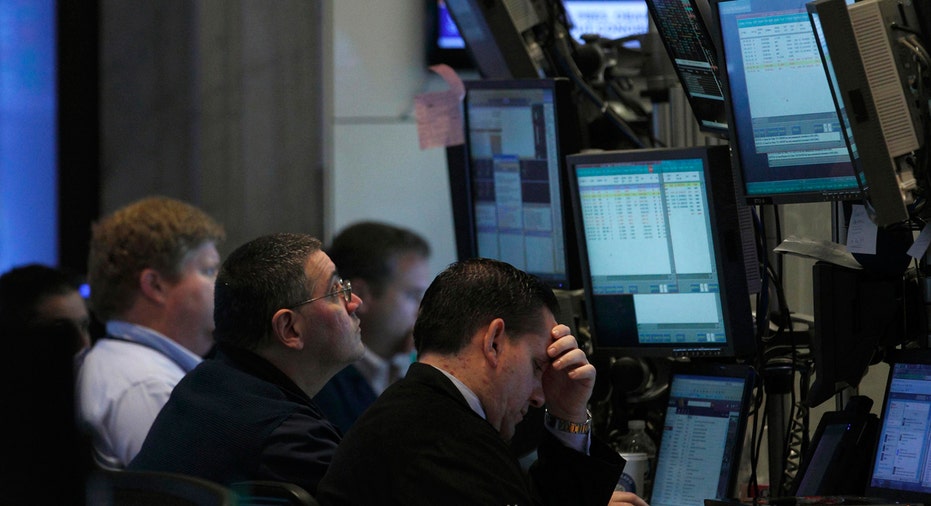Energy, Materials Slug Stocks Amid Slew of Fed Speak

U.S. equity markets saw a steep selloff after comments from a prominent Fed officials amid a central-bank packed session.
The Dow Jones Industrial Average declined 254 points, or 1.44% to 17448. The S&P 500 shed 28 points, or 1.40% to 2046, while the Nasdaq Composite dropped 61 points, or 1.22% to 5005.
Energy and materials saw significant declines during the trading day as all 10 sectors finished in the red.
Today’s Markets
Investors reacted strongly to comments from the St. Louis Federal Reserve President, James Bullard, who said the United States is entering into an era of permanently lower inflation and interest rates. He said the seven years of near-zero rates could challenge fundamental assumption about monetary policy in the nation.
The comments come from prepared remarks for a Cato Institute conference in Washington D.C.
The yield on the benchmark 10-year U.S. Treasury bond declined 0.008 percentage point to 2.304%.
Meanwhile, in prepared remarks Richmond Fed President Jeffrey Lacker said economic activity is “driven predominantly by factors beyond the control of monetary policy.” He pointed to productivity and population growth as a couple of examples. Lacker, who has voted to hike rates at past meetings, said the pessimism over the economic growth in the nation is not warranted, and the central bank should explore how its toolkit has changed since the financial crisis.
Fed Chairwoman Janet Yellen gave opening remarks before the Federal Reserve Conference on the topic of monetary policy implementation and transmission in a post-crisis period. While investors hoped to hear any hints as to whether Yellen and the Federal Open Market Committee will raise rates at next month’s meeting, they didn’t get it. Instead, the Fed chief discussed Fed policy in theory without relation to the current situation.
Fed Vice Chair Stanley Fischer was set to speak later in the evening at the same conference, discussing how to incorporate financial stability into monetary policy.
Remarks from Fed officials come on the heels of comments on monetary policy in the eurozone from European Central Bank President Mario Draghi.
Draghi, speaking to a group of European Union lawmakers on Thursday, said “signs of a sustained turnaround in core inflation have somewhat weakened.” He added that the ECB’s “powerful and flexible” asset purchase program is likely to run past September 2016. In March, the ECB began buying 60 billion euros a month – mostly of government bonds.
The comments sent the euro down 0.25% against the U.S. dollar, which traded mixed against a basket of global currencies. European markets also lost ground as the Euro Stoxx 50, which tracks large-cap companies in the eurozone, declined 1.56%. The German Dax shed 0.90%, while the French CAC 40 declined 1.71%, and the UK’s FTSE 100 shed 1.60%.
“Mario Draghi has helped European markets to a choppy start to the day, with his usual plethora of dovish comments driving the euro lower,” IG market analyst Josh Mahony said in a note. “Despite Mr. Draghi’s dovish tones, the choppiness in the FTSE reflects the weakness of the oil and gas sector, following yet another drop in crude prices yesterday.”
Back in the U.S. on the economic front, data from the Labor Department showed first-time claims for unemployment benefits was unchanged from last week at 276,000. Economists expected claims to fall to 270,000.
“As opposed to yesterday, today we have a trifecta of potential drivers of intraday trading – earnings, economic data and Fed speeches. Any one of the three could have an over-weighted impact on trading, but given the fact that we have three and that the odds are great that they will not drive the same result, we may see some homogenization of intraday trend,” Peter Kenny, independent market analyst said in a note.
On the earnings front, investors closely eyed reports from Kohl’s and Nordstrom following Wednesday’s plunge in Macy’s (NYSE:M) shares. The retailer reported mixed results in the third quarter as a strong dollar, unusually warm winter weather, and a decline in shoppers weighted on revenue figures, forcing the company to revise lower its full-year projections.
Elsewhere, commodities were lower across the board. Global crude oil prices dipped as supply worries continue to plague the market. The EIA said weekly crude oil stockpiles showed a 4.22 million barrel build, compared to forecasts for a one million barrel build. U.S. crude dropped 2.75% to $41.75 a barrel, while Brent, the international benchmark, shed 3.82% to $44.06
Metals were mixed as gold prices dipped 0.36% to $1,080 a troy ounce. Silver slid 0.27% to $14.22 an ounce, while copper declined 1.96% to $2.17 a pound.



















